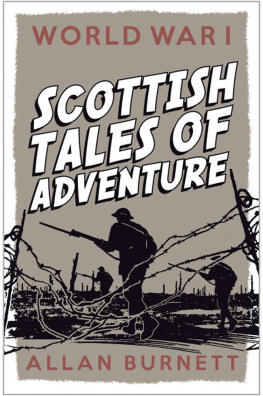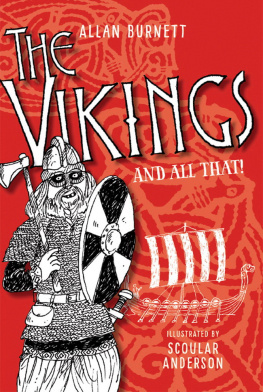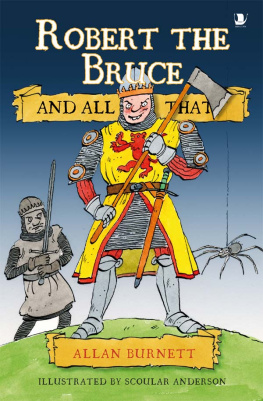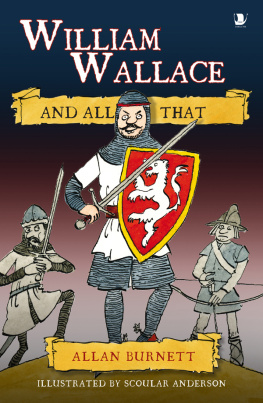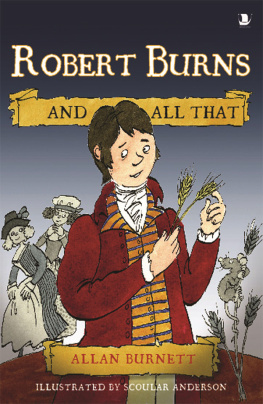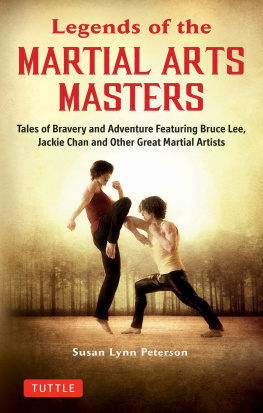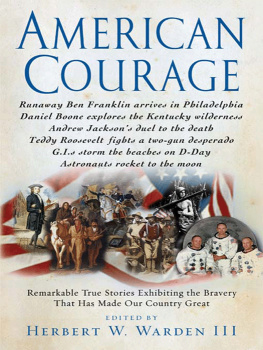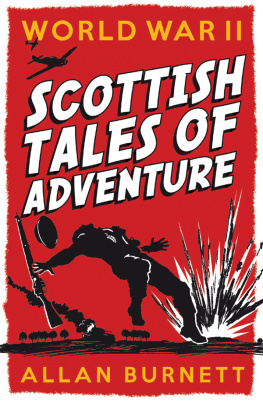World War I
Scottish Tales of Adventure
Allan Burnett is one of Scotlands best-selling authors for young readers. He was born and brought up in the Western Isles and educated at the University of Edinburgh, while working after dark as a ghost tour guide. Allan has written many other books, including Mary, Queen of Scots and All That and Invented in Scotland Scottish Ingenuity and Inventions through the Ages. He is also the author of World War II: Scottish Tales of Adventure.
This eBook edition published in 2014 by
Birlinn Limited
West Newington House
Newington Road
Edinburgh
EH9 1QS
www.birlinn.co.uk
In memory of
Andrew Sinclair, John Sinclair and Frederick John Burnett Royal Scots
First published in 2014 by
Birlinn Limited
Copyright Allan Burnett, 2014
Illustrations copyright Chris Brown, 2014
The moral right of Allan Burnett to be identified as the author of this work has been asserted by him in accordance with the Copyright, Designs and Patents Act 1988
All rights reserved.
No part of this publication may be reproduced, stored or transmitted in any form without the express written permission of the publisher.
ISBN: 978 1 84158 932 9
eBook ISBN: 978 0 85790 063 0
British Library Cataloguing-in-Publication Data
A catalogue record for this book is available from the British Library
Contents
Introduction
Merry it was to laugh there
Where death becomes absurd and life absurder.
For power was on us as we slashed bones bare
Not to feel sickness or remorse of murder.
Wilfred Owen
Lads, youre wanted! Over there,
Shiver in the morning dew,
More poor devils like yourselves
Waiting to be killed by you.
Ewart Alan Mackintosh
In this book of stories from the First World War, soldiers dodge snipers bullets and hurl grenades at the unseen enemy while experimental breathing apparatus shields them from deadly gas.
Men piloting an amazing new invention called the aeroplane zoom through the clouds with guns blazing at their opponents.
Pioneering women doctors and their staff save soldiers lives while they are bombarded with cannon-fire and chased through foreign lands.
They are stories of adventure and excitement, of courage and optimism. They are tales of triumph in adversity.
But the First World War was also about death and destruction on a gigantic scale, of intolerable misery and cruelty, often with no way out and no happy endings.
For me, these two sides to the war the exhilarating and the miserable are equally important. We need both to make sense of it, to comprehend why people went to fight in the first place, and to understand why there was so much regret after it was all over.
That is why the stories in this book also show aspects of the wars dark side. They demonstrate, too, how a soldiers fortunes often depended on luck.
Some people believe that luck is just down to chance, like rolling a dice. But others believe it is down to destiny or fate.
Take the moment that led to the outbreak of the First World War. It took place on a street corner in a city called Sarajevo, the capital of what was then Bosnia.
Back in the summer of 1914 a teenager called Gavrilo Princip stood there and pulled out a pistol. He took aim and shot dead a man called Archduke Franz Ferdinand and his wife Sophie, who were being driven past in their open-topped motor car.
The Archduke had been a very important person, and his friends swore revenge on Princip and his friends. One thing led to another, and eventually whole empires took sides over the issue, like gangs fighting in a playground just on a far, far bigger scale.
On Princips side were the Allies the Russian, French and British empires, of which Scotland was part. And on the other side were the empires of Austro-Hungary, Turkey and Germany.
The result was the First World War.
When I was twelve years old, I stood in the exact spot where Gavrilo Princip had fired his gun more than three-quarters of a century earlier. I felt as though the assassin was still there, standing right next to me, and taking aim at his victims.
What would have happened, I wondered, if by chance the bullets had not hit their target? In fact, the Archduke was supposed to have been travelling by a different route for his own safety, but his driver took a wrong turn. If only the driver had not made that fateful error and given Princip his chance. The chain of events that followed might have been avoided.
Yet, perhaps the world was simply destined to go to war. The big empires were looking for an excuse to fight, and now they had it.
My experience in Sarajevo led me to think about other important questions too. Like, what did the First World War have to do with me? In time, I found some interesting answers.
I visited another city called Ypres in Belgium. You will read about what happened there in this book.
Some of the biggest and bloodiest battles of the First World War were fought around Ypres. The place was flattened and had to be rebuilt. A huge number of Scottish soldiers died there. In fact some historians conservatively estimate that over 100,000 Scots lost their lives in the First World War. Others argue that Scotland lost more men per head of population than any other country except Turkey and Serbia.
Whats more, I learned that at least two of my own great-grandfathers and a great-great grandfather had all fought in that war in a regiment called the Royal Scots.
One of them was sent to fight in a place called Gallipoli, in Turkey. One day, the battle trench he was in was hit by a bomb and it collapsed on top of him. Eventually his wiggling fingers could be seen protruding from the rubble and he was pulled out alive. Many of his friends were not so lucky.
These discoveries brought the war much closer to home.
Eventually I realised that the First World War had everything to do with my life, and with Scotland, the country I grew up in.
Every street, farm and island has its share of amazing and sorrowful First World War stories to tell. Chiselled into stone memorials in cities, towns and villages across the country are the names of the men who died.
The world they left behind was changed for ever.
The war brought new technology and new ways of doing things, as well as great anger about the loss of life. The people of Scotland were deeply affected.
While researching this book I discovered that the place I went for my daily walk was affected in its own special way, and seems to be haunted by some of the wars most famous figures. It is a hill with two summits that overlooks Edinburgh, the nations capital, from the south-west. The hill, known as Craiglockhart, is adorned by woods, a golf course and some grand Victorian buildings.
Craiglockhart Hill gives a fine view of Edinburgh, where, during the First World War, huge cigar-shaped German airships hung in the sky next to the castle and dropped their bombs.
Edinburgh was the home town of Field Marshall Douglas Haig, commander of the British forces on the wars Western Front. Many historians believe the Allied victory that ended the First World War in 1918 was largely thanks to Haigs determined leadership, his inspirational battle tactics and his ability to rally the troops.
At least, that is one side of the story.
The other way of looking at it is that Haig, and other war leaders, made errors that doomed hundreds of thousands of men to a miserable death.

